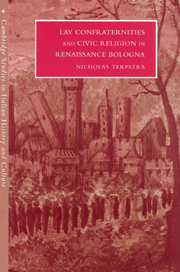Book contents
- Frontmatter
- Contents
- List of figures
- List of tables
- Acknowledgments
- Preface
- Prologue
- 1 The early quattrocento: confraternities, observance movements, and the civic cult
- 2 Lay spirituality and confraternal worship
- 3 The mechanics of membership
- 4 Communal identity, administration, and finances
- 5 Confraternal charity and the civic cult in the late fifteenth and early sixteenth centuries
- Epilogue
- Bibliography
- Index
Prologue
Published online by Cambridge University Press: 24 September 2009
- Frontmatter
- Contents
- List of figures
- List of tables
- Acknowledgments
- Preface
- Prologue
- 1 The early quattrocento: confraternities, observance movements, and the civic cult
- 2 Lay spirituality and confraternal worship
- 3 The mechanics of membership
- 4 Communal identity, administration, and finances
- 5 Confraternal charity and the civic cult in the late fifteenth and early sixteenth centuries
- Epilogue
- Bibliography
- Index
Summary
One crisp October day in 1260 the civic magistrates and bishop of Bologna stood at the Porta Maggiore looking eastward down the old Roman road which led to Imola and the Adriatic coast. Around them were hundreds and perhaps thousands of citizens. Behind them, within the recently completed walls of the city, the shops were shuttered, the market stalls closed, and the people were waiting. Down the road there appeared crosses and banners borne by priests and followed by marching ranks of Imolese men, women and children, wailing “peace and mercy, peace and mercy.” The slash of whips punctuated their cries as some of the marching penitents beat themselves. As they reached the party waiting at the city gate their cry was taken up by the Bolognese, who moved down the Strada Maggiore into the heart of the city. For eight days normal urban life stopped as penitents of all ages and classes processed through the streets, squares, and churches of Bologna, flagellating, kneeling at altars, and crying out for “peace and mercy.” On the ninth day they issued out of the westerly Porta San Felice and headed for Modena.
The community which prostrated itself before God in this way was near the peak of its power and yet riven by tensions.
- Type
- Chapter
- Information
- Publisher: Cambridge University PressPrint publication year: 1995



